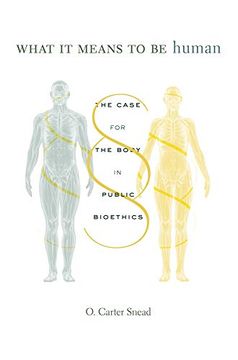What it Means to be Human: The Case for the Body in Public Bioethics (in English)
Synopsis "What it Means to be Human: The Case for the Body in Public Bioethics (in English)"
One of the Wall Street Journal’s Top Ten Books of the YearA leading expert on public bioethics advocates for a new conception of human identity in American law and policy.The natural limits of the human body make us vulnerable and therefore dependent, throughout our lives, on others. Yet American law and policy disregard these stubborn facts, with statutes and judicial decisions that presume people to be autonomous, defined by their capacity to choose. As legal scholar O. Carter Snead points out, this individualistic ideology captures important truths about human freedom, but it also means that we have no obligations to each other unless we actively, voluntarily embrace them. Under such circumstances, the neediest must rely on charitable care. When it is not forthcoming, law and policy cannot adequately respond.What It Means to Be Human makes the case for a new paradigm, one that better represents the gifts and challenges of being human. Inspired by the insights of Alasdair MacIntyre and Charles Taylor, Snead proposes a vision of human identity and flourishing that supports those who are profoundly vulnerable and dependent―children, the disabled, and the elderly. To show how such a vision would affect law and policy, he addresses three complex issues in bioethics: abortion, assisted reproductive technology, and end-of-life decisions. Avoiding typical dichotomies of conservative-versus-liberal and secular-versus-religious, Snead recasts debates over these issues and situates them within his framework of embodiment and dependence. He concludes that, if the law is built on premises that reflect the fully lived reality of life, it will provide support for the vulnerable, including the unborn, mothers, families, and those nearing the end of their lives. In this way, he argues, policy can ensure that people have the care they need in order to thrive.In this provocative and consequential book, Snead rethinks how the law represents human experiences so that it might govern more wisely, justly, and humanely.

